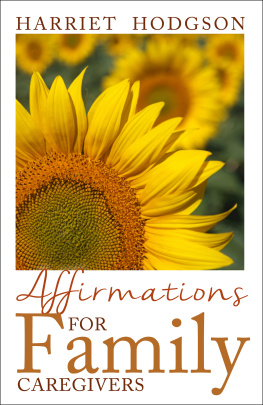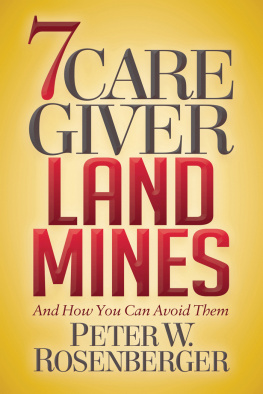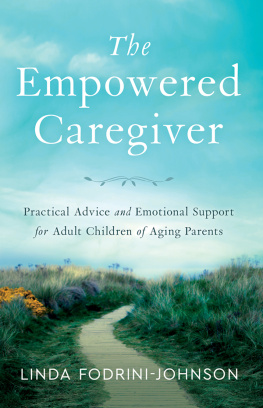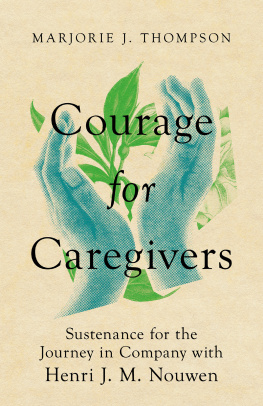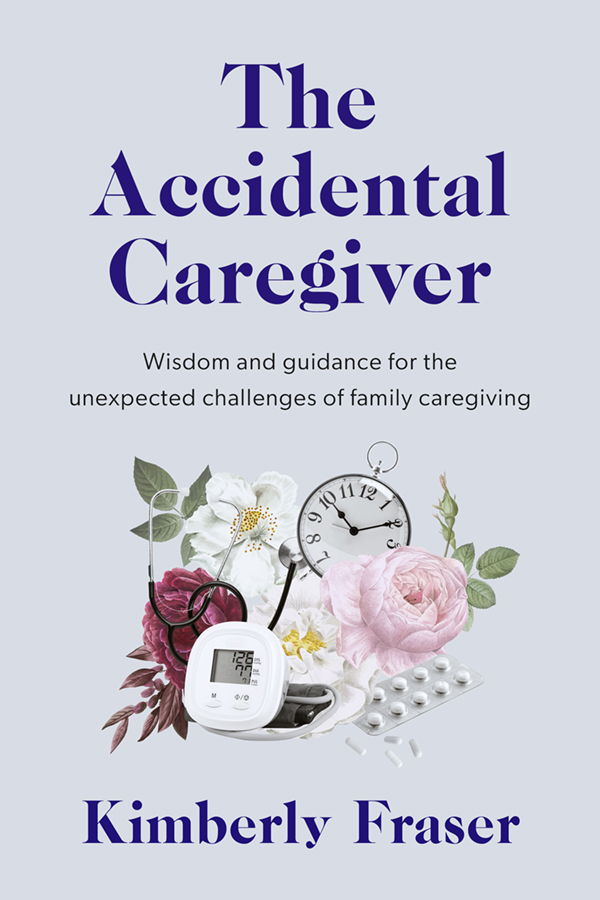
Table of Contents
Guide
Pages
THE ACCIDENTAL CAREGIVER
Wisdom and Guidance for the Unexpected Challenges of Family Caregiving
KIMBERLY FRASER

Sutherland House
416 Moore Ave., Suite 205
Toronto, ON M4G 1C9
Copyright 2022 by Kimberly Fraser
All rights reserved, including the right to reproduce this book or portions thereof in any form whatsoever. For information on rights and permissions or to request a special discount for bulk purchases, please contact Sutherland House at Sutherland House and logo are registered trademarks of The Sutherland House Inc.
First edition, October 2022
If you are interested in inviting one of our authors to a live event or media appearance, please contact for more information about our authors and their schedules.
We acknowledge the support of the Government of Canada.
Manufactured in Turkey
Cover designed by Lena Yang
Library and Archives Canada Cataloguing in Publication
Title: The accidental caregiver : wisdom and guidance for the unexpected challenges of family caregiving / Kimberly Fraser.
Names: Fraser, Kimberly, author.
Identifiers: Canadiana 20220234396 | ISBN 9781989555811 (softcover)
Subjects: LCSH: Caregivers.
Classification: LCC RA645.3 .F73 2022 | DDC 649.8dc23
ISBN 978-1-989555-81-1
eBook ISBN 978-1-989555-89-7
To my parents
To my father, Donald Polley. Dad, you have always been my North Star in life, in sickness, and in death.
To my mother, Myrna Polley. Mom you are my inspiration. The love and care you gave not only to Dad, but to all of us over the years is immeasurable. You are the consummate caregiver.
FOREWORD
THIS IS A BOOK FOR everyone.
Most of us have been caregivers, are currently caregivers, or will one day become caregivers. Many of us will eventually need caregivers. Some of us are professionals who care for those who are ill but can provide exemplary care only if we understand the experiences and challenges of their caregivers.
This book is necessary as there arent many tools or practical handbooks available to caregivers. Caregivers need this book because, as the title suggests, they assume the caregiving role unexpectedly, and usually without the training or knowledge to handle the diverse tasks and stresses they will have to manage. Even the author herself, a nurse with a background directing a large home support business, in a family of nurses, found it a struggle when her father needed increasing levels of care.
Before becoming caregivers, many might have said that they couldnt manage such ongoing, complex responsibility for another person; and yet most find themselves able and ready when the time comes, mustering the inner strength to get on with it. In addition to providing personal care, caregivers assume a leading role in researching illness and best approaches to management, treatment options, and access to resources. They may also be powerful advocates, not only for their loved ones but for a better and more responsive health care system.
Dr. Kimberly Fraser is an ideal person to shine a light on the humanity, the sense of loss and life change, the demands, the rewards, the support needs, and the personal costs of caregiving. She has extensive personal as well as professional experience: her father, who I knew, had progressive MS, and she writes about the challenges this presented to her mother and herself with frank honesty.
As a neurologist whose research unit cared for patients with MS, I needed to understand the abilities, challenges, resources, and coping skills of our patients caregivers. Since there was no literature to guide us when we began in the 1970s, we did some of our own research. At that point, all of the published studies focused on women as caregivers and appeared in nursing journals; yet in the case of MS, 75% of the caregivers were men. We were interested in how they fared in this role. Our research unit found, despite a popular prejudice, that men were good caregivers, although there were some differences. They took caregiving on more like a project, whereas female caregivers adopted the role as a natural process. We also found the male caregivers were better at taking care of their own health than women, but were more reluctant to seek support, especially from outside agencies, as they tended to feel this meant they were failing as caregivers. Overall, the care they provided was impressive, perhaps because they usually had a long time to ease into the role. But this book would have been a great help for both patients and caregivers to allow them to plan and prepare. It also would have helped us to better focus on many of the issues so clearly voiced by our patients.
I learned more when my family and I became caregivers for my mother-in-law, who battled dementia, and later my daughter, who died of a brain tumor. Although I have been a physician for half a century, my career caring for MS patients did not prepare me for the role of caregiver. I had to learn along with my wife and four children, who rose to the challenge with love and skill as we dealt with each day as it came. Everyone had busy lives and family responsibilities but adjusted to help, even when this required adopting a shared rotating twenty-four-hour schedule.
The structure of this book presents a series of central issues in caregiving, powerfully underlined by interviews and personal stories. The voices of the caregivers are clear, even eloquent. Their stories are sometimes difficult to hear, but all are instructive. Dr. Fraser has interviewed seventy-five caregivers, and of course has interacted with hundreds of others over the course of her career.
Part of her innovative approach has been to organize creative workshops using collage in which caregivers were encouraged to identify words and images that captured the essence of their caregiving experience. The arts clearly can do a lot to help patients to cope with, understand, and learn from their experiences. Expressive art, collage making, and journaling are all examples of creative enterprises that can be of significant benefit to caregivers and patients alike.
In these workshops, many of the caregivers Dr. Fraser interviews describe feeling like prisoners due to inadequate support, constant demands, and a sense of being cut off from friends, community, and their normal social lives. They lose the loved one they once knew, even though that person is still physically present. One woman speaks of being a widow with a husband. There is also a loss of sense of self as normal life fades into the caregiving process.
The voices of the caregivers featured here remind me that our approach to health care often has a missing element. We have been admonished in recent times to remember the individual when we are diagnosing and treating illness. Sir William Osler, the famed Canadian physician of the nineteenth century, said, Ask not what disease the person has, but rather what person the disease has. That is wise, but it ignores the other person in the room who also requires information, resources, and support, and who is also suffering. They, too, have needsand attention paid to them will be reflected in better care for the patient.
The Covid-19 pandemic brought to light the importance of caregiving in our society. The devotion and hard work of families is often invisible when health care is considered as a purely institutional and administrative system. During the pandemic, family members could not enter care facilities where they had often complemented the care provided by professionals and staff, contributed important emotional and social support, and enhanced the quality of life of the patients. Although the role of families rarely makes it to a flow sheet or budget consideration, the crisis reminded everyone of the vital role of families in health care.
Next page

